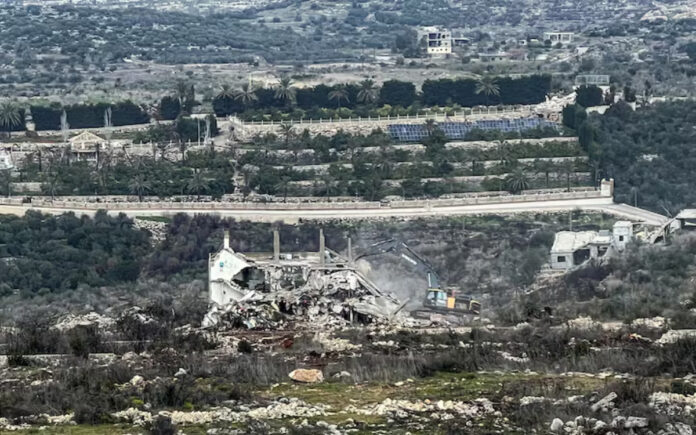Jerusalem: Israel will maintain military positions in five locations in southern Lebanon beyond the February 18 deadline for withdrawal, a military spokesperson confirmed on Monday. The decision, aimed at securing northern Israeli communities, comes amid ongoing regional tensions and diplomatic negotiations.
Under a truce brokered by Washington in November, Israeli forces were initially given 60 days to withdraw after launching a ground offensive against Hezbollah in early October. The deadline was later extended to February 18. However, Israeli and Lebanese officials, along with foreign diplomats, had anticipated that Israel would keep troops stationed at key locations along the border.
“We need to remain at those points at the moment to defend Israeli citizens, to make sure this process is complete, and eventually hand it over to the Lebanese armed forces,” military spokesperson Lieutenant Colonel Nadav Shoshani said during a press briefing. He emphasized that the move aligns with the ceasefire agreement.
The locations where Israeli troops will remain are strategically positioned near Israeli communities or at elevated points overlooking towns such as Metula, Israel’s northernmost settlement. “Basically, the security situation is very, very complex,” Shoshani added.
Displaced Lebanese from the country’s southern border began returning home to devastated villages as Israel pulled troops from most of the territory https://t.co/O7VIxwSscx pic.twitter.com/SzGqJqWe5D
— Reuters (@Reuters) February 19, 2025
Security Concerns and Diplomatic Efforts
A Lebanese official and two foreign diplomats indicated that while Israeli forces might withdraw from Lebanese villages, they are likely to retain positions at overlook points. The objective is to reassure displaced northern Israeli residents, who are set to return home on March 1, following months of cross-border hostilities.
The nearly year-long conflict saw tens of thousands of Israeli civilians displaced due to Hezbollah rocket fire, while more than a million people in Lebanon fled Israeli airstrikes. Fighting ceased in late November under a truce agreement that mandated the withdrawal of Israeli troops from southern Lebanon, Hezbollah’s disarmament in the region, and the deployment of Lebanese military forces.
The ceasefire agreement explicitly states that only “official military and security forces” can carry arms in Lebanon, and the Lebanese government is responsible for preventing the transfer of weapons to non-state groups. The agreement, considered more stringent than previous United Nations Security Council resolutions, is being monitored by a committee chaired by the U.S. and France.
Opposition and Alternatives
Lebanon’s President Joseph Aoun, who has insisted on a full Israeli withdrawal by the deadline, voiced concerns on Monday, stating, “I am afraid that the complete (Israeli) withdrawal will not be achieved tomorrow.”
Diplomatic discussions are ongoing regarding alternative security arrangements. France has proposed reinforcing U.N. peacekeeping forces, including French troops, at key border points to replace Israeli forces.
Also Read | Polish Border Guards Seize $15M in Cocaine from Baltic Seabed
However, Hezbollah warned on Sunday that any Israeli troops remaining in Lebanon beyond Tuesday would be considered an occupying force.
Historical Context and Ongoing Tensions
Israel previously occupied southern Lebanon for 22 years before withdrawing in 2000 following persistent attacks from Hezbollah, which was founded in 1982 in response to Israeli incursions.
The latest war saw nearly a year of hostilities, with exchanges of fire primarily focused along the border. The conflict escalated in September when Israel intensified its military campaign, targeting Hezbollah’s senior leadership in airstrikes and deploying ground forces into southern Lebanon.
Also Read | Washington and Moscow Advance Peace Talks—Without Kyiv
As diplomatic talks continue, the future of security arrangements in the region remains uncertain, with tensions between Israel and Hezbollah showing no signs of immediate resolution.



